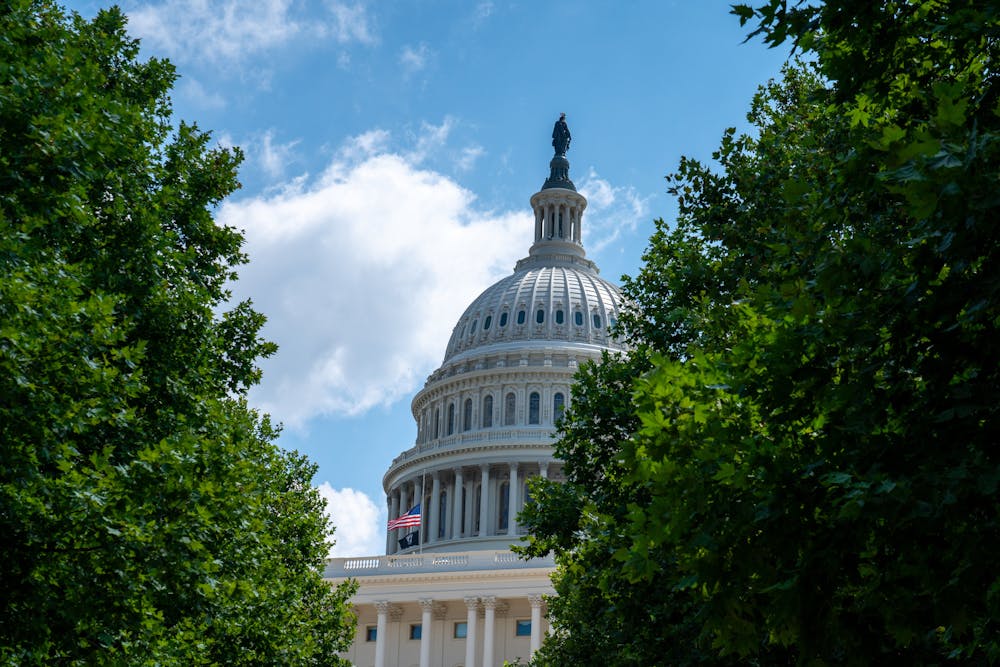
The Republican-led United States House Committee on Education and the Workforce released a 325-page report with the committee’s findings from its yearlong investigation of several higher education institutions — including Penn — on Oct. 31.
The Congressional probe looked into Penn’s response to campus antisemitism over the past year, revealing details about how the University handled disciplinary proceedings, former Penn President Liz Magill’s resignation, and pro-Palestinian campus protests.
Here are three key takeaways from the report.
Private communication alleged systemic failures from the University’s administration
The report asserted that Penn administrators actively sought to manage positive press coverage while failing to adequately support Jewish students and called for an investigation into University compliance with federal funding laws.
It cited an email exchange between Magill and former University Board of Trustees Chair Scott Bok in which the admins allegedly “disparaged” former New Jersey Gov. Chris Christie’s calls for Magill’s resignation.
“Christie called for you to be fired?” Bok wrote. “That’s outrageous. He knows nothing about the situation.”
“Part of the political branch of this campaign,” Magill replied.
A follow-up comment from Bok — describing an unidentified group as “so easily purchased” — was highlighted in the report as a reflection of “longstanding antisemitic tropes about Jewish money and influence.”
In a statement to the Daily Pennsylvanian, Bok stated that he was “puzzled why this one email exchange was singled out from the 400,000 pages of documents” reviewed by the committee and emphasized his belief that outside commentary from political figures “was not going to be helpful to anyone at Penn.”
The committee also painted a picture of Penn administrators exhibiting a “lack of accountability” and reluctance to act decisively against campus antisemitism. It detailed a surge in antisemitic incidents on campus following the Oct. 7, 2023 Hamas attacks, to which Penn’s response allegedly included only mild sanctions such as probation or reflective essays requirements.
Disciplinary proceedings relied heavily on the University’s Guidelines on Open Expression and were primarily handled by Penn’s Center for Community Standards and Accountability
The report devoted substantial attention to disciplinary actions involving Penn community members during the 2023-24 academic year. Ten pages of “STRICTLY CONFIDENTIAL” disciplinary records detailed 14 unique incidents on campus between September 2023 and May 2024, documenting case statuses, “actions to date,” and outcomes, while omitting personal information of involved students.
The report revealed that three students faced semester-long suspensions and 14 were placed on disciplinary probation following various incidents last year, including participation in the Gaza Solidarity Encampment, a “riot” outside Interim Penn President Larry Jameson’s residence, and attempted building occupations.
The records revealed that the CSA investigated most incidents, applying the Guidelines on Open Expression and the Code of Student Conduct to pursue sanctions against pro-Palestinian student organizers. Five cases involving 31 students are still open.
The report specified that students participating in the November 2023 Freedom School for Palestine sit-in at Houston Hall avoided discipline despite warnings, as the Vice Provost of University Life “withdrew the referral.”
Further incidents included the May 10 rally at Jameson’s house, where demonstrators allegedly caused $18,000 in damage by breaking open the gate and deploying smoke bombs, resulting in two disciplinary cases. Additionally, seven students faced disciplinary action following a May 17 attempted occupation of Fisher-Bennett Hall, with three suspended and others placed on probation.
The “meager” sanctions, the report alleged, illustrated what the committee described as a failure by Penn administrators to adequately respond to antisemitic actions.
The report also raised questions regarding Penn’s compliance with Title VI of the Civil Rights Act of 1964, which prohibits discrimination based on race, color, or national origin in institutions receiving federal funding.
The document cited instances of harassment, intimidation, and property damage directed at Jewish students suggesting a potentially hostile campus environment in which the University “turned their backs” and “intentionally [withheld] support in a time of need.”
The report gave little focus to Penn compared to peer institutions
In what they described as a review of 400,000 documents, the committee’s 325-page report dedicated less than 30 pages to Penn.
Bok wrote to the DP that he was “pleased” by the lack of focus on the University.
Nonetheless, Penn has faced significant scrutiny from Congress over the past year, including three federal investigations into Penn’s response to antisemitism on campus.
The House Committee on Education and the Workforce led the charge in December 2023, launching a formal investigation into the University following former Magill’s controversial testimony in a Dec. 5, 2023 congressional hearing.
In January, the House Ways and Means Committee joined the inquiry, warning that Penn’s tax-exempt status could be at risk due to alleged lapses in protecting Jewish students. By April, the House expanded its examination of antisemitism on college campuses, with U.S. Rep. and Speaker of the House Mike Johnson (R-La.) announcing a comprehensive investigation across the House that scrutinized the University’s federal funding and campus policies under the oversight of six committees.
The Daily Pennsylvanian is an independent, student-run newspaper. Please consider making a donation to support the coverage that shapes the University. Your generosity ensures a future of strong journalism at Penn.
Donate



